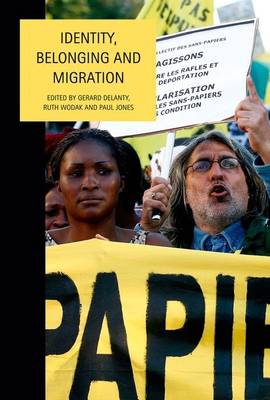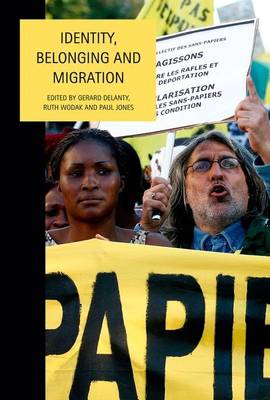
Door een staking bij bpost kan je online bestelling op dit moment iets langer onderweg zijn dan voorzien. Dringend iets nodig? Onze winkels ontvangen jou met open armen!
- Afhalen na 1 uur in een winkel met voorraad
- Gratis thuislevering in België vanaf € 30
- Ruim aanbod met 7 miljoen producten
Door een staking bij bpost kan je online bestelling op dit moment iets langer onderweg zijn dan voorzien. Dringend iets nodig? Onze winkels ontvangen jou met open armen!
- Afhalen na 1 uur in een winkel met voorraad
- Gratis thuislevering in België vanaf € 30
- Ruim aanbod met 7 miljoen producten
Zoeken
Identity, Belonging and Migration
€ 23,95
+ 47 punten
Omschrijving
This volume addresses the question of migration in Europe. It is concerned with the extent to which racism and anti-immigration discourse has been to some extent normalised and 'democratised' in European and national political discourses. Mainstream political parties are espousing increasingly coercive policies and frequently attempting to legitimate such approaches via nationalist-populist slogans and coded forms of racism. Identity, Belonging and Migration shows that that liberalism is not enough to oppose the disparate and diffuse xenophobia and racism faced by many migrants today and calls for new conceptions of anti-racism within and beyond the state. The book is divided into three parts and organised around a theoretical framework for understanding migration, belonging, and exclusion, which is subsequently developed through discussions of state and structural discrimination as well as a series of thematic case studies. In drawing on a range of rich and original data, this timely volume makes an important contribution to discussions on migration in Europe.
Specificaties
Betrokkenen
- Uitgeverij:
Inhoud
- Aantal bladzijden:
- 256
- Taal:
- Engels
- Reeks:
- Reeksnummer:
- nr. 17
Eigenschappen
- Productcode (EAN):
- 9781846316890
- Verschijningsdatum:
- 1/03/2011
- Uitvoering:
- Paperback
- Formaat:
- Trade paperback (VS)
- Afmetingen:
- 155 mm x 234 mm
- Gewicht:
- 589 g

Alleen bij Standaard Boekhandel
+ 47 punten op je klantenkaart van Standaard Boekhandel
Beoordelingen
We publiceren alleen reviews die voldoen aan de voorwaarden voor reviews. Bekijk onze voorwaarden voor reviews.










